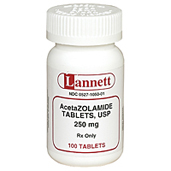There are many reasons why a dog might
develop a red, painful eye. One of the most serious causes is
glaucoma. Glaucoma is defined as a higher than normal pressure
within the eyeball. Elevated eye pressure is very painful and
damages the structures within the eye that are essential to sight, which
can potentially lead to blindness.
"If glaucoma medications don't work, surgery to reduce eye pressure or remove a blind but painful eye should be considered."
Glaucoma can be a primary or secondary
disease. In primary glaucoma, the eye does not develop correctly.
Some breeds of dogs are predisposed to primary glaucoma, including cocker
spaniels, basset hounds, chows, shar-peis, huskies, Boston terriers,
samoyeds, dalmatians, poodles, and shih tzus. Even though the
eyes were never technically normal, symptoms usually do not develop
until dogs have reached maturity and rarely in both eyes at the same
time. Secondary glaucoma comes about as a result of eye injury
or disease such as infection, inflammation, a tumor, or a displaced
lens.
Symptoms of Glaucoma
Dogs with glaucoma typically have one
or more of the following symptoms:
- Holding the affected eye
partially or completely closed
- Third eyelid elevation
- Red or cloudy eye
- Rubbing at the eye
- Excessive tearing
- Dilated pupil
- An enlarged eyeball
- Sudden onset of poor vision
Eye pressures can quickly rise to dangerous
levels. If your dog has any of these symptoms, contact your veterinarian
immediately.
Diagnosing Canine Glaucoma
A veterinarian can easily test a dog's
eye pressure using specialized equipment. He or she will first
numb the surface of the dog's eye with a medicated drop so that the
procedure is not uncomfortable. To rule out other potential causes
for a dog's symptoms, your veterinarian will also perform a thorough
physical and ophthalmic exam, check for adequate tear production and
wounds on the surface of the eye, and maybe recommend blood work and
other tests if a systemic disease could to blame for the glaucoma.
Your veterinarian may refer you to a veterinary ophthalmologist for
advanced testing or specialized treatment if necessary.
Treating and Preventing Glaucoma

When a dog is initially diagnosed with
severe glaucoma, emergency treatment will be instituted to try to save
sight in that eye and relieve pain. Topical drops like Pilocarpine or Dorzolamide, oral medications,
and intravenous infusions may all be used to rapidly bring the pressure
down to a safe level. Long-term treatment options for glaucoma include
both topical and oral pet
medications like Acetazolamide. Dogs may require several different
types of drugs to keep their eye pressures down. In cases of primary
glaucoma, it is usually a good idea to treat both eyes, even if one
has not yet developed symptoms, to try to preserve sight.
If medications don't work, surgery
to reduce eye pressure or remove a blind but painful eye should be considered.
Another option for blind eyes is an injection into the eye that destroys the cells that produce the fluid responsible for maintaining eye pressure.
The prognosis for dogs with glaucoma
varies. If the underlying cause of secondary glaucoma can be addressed,
eye pressures should return to and remain normal. Dogs with primary
glaucoma, however, usually require life-long therapy and close monitoring
so that their treatment protocols can be modified as their condition
warrants. Keep in mind that even if a dog with glaucoma eventually
does become blind, it should be able to enjoy a happy life with a little
extra care from its owners.
The above is provided for information purposes only and should not be used for the diagnosis or treatment of any condition.
This information does not cover all possible variables, conditions, reactions, or risks relating to any topic, medication, or product and should not
be considered complete. Certain products or medications may have risks and you should always consult your local veterinarian concerning the treatment of
your pet. Any trademarks are the property of their respective owners.